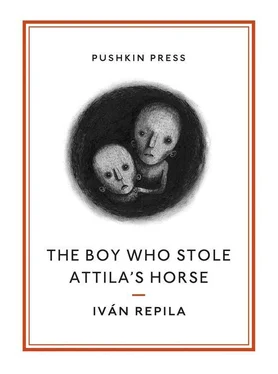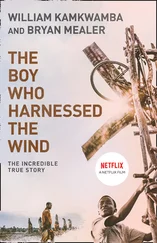‘Want to play?’
Small perks up all of a sudden.
‘Yes. What shall we play?’
‘A guessing game.’
‘I spy with my little eye something beginning with en.’
Small pulls an intrigued face and strokes a non-existent beard, squinting his eyes. He knows his brother, and, given that there aren’t too many options within their line of vision from the bottom of the well, he knows which word he is thinking of. But he enjoys playing, and the best thing about the game is the game itself.
‘Necessity!’
‘No.’
Words beginning with en pile up in his head, all of them a product of his captive condition. He decides to stretch the rope a little more, to test his brother’s resistance.
‘Necrosis!’
‘No.’
‘Niche!’
‘No!’
He loosens the knot a fraction: his brother is clearly losing the will to go on.
‘Nothing!’
‘No.’
‘It’s really difficult. Give me a clue.’
‘OK… You can see it, but you can’t touch it.’
Now is the moment of joy. He can’t put it off any longer.
‘Nightfall!’
‘Yes! Well done!’ bursts out Big with an enormous smile.
‘Again!’
‘Something beginning with… ar.’
Small admires the simplicity of his brother. It must be easy to make decisions in a world with such radical contrasts, where everything is black and white. It must be easy to do the right thing.
‘Rage!’
‘No.’
Interred in a well, his brother sees roots. He cannot see anything else because he looks in the way that dogs look. It is that basic, that beautiful. A piece of meat and a few pats of his back would suffice to make him feel loved. Roots. For Small, there are entities more certain than those things he can touch.
‘Reality!’
‘No!’
Human Remains. Rations of insects. Red-Raw knees. Rebellions. Ravings. Routines. Rituals. Rot. The game could be a lot more fun if only his brother understood. He throws him a bone out of the goodness of his heart.
‘Rocks!’
‘Warmer!’
‘Am I close?’
‘Very. Go on!’
Nor does he want his brother to think him an idiot.
‘Roots!’
‘You got it!’
‘Cool!’ Small hoots exaggeratedly. ‘Now it’s my turn.’
‘OK, but none of those abstract words. Only things that can be seen.’
‘Agreed.’
‘I spy…’ begins Small.
‘I spy,’ says Big.
‘I spy with my little eye… Something beginning with… bee. With bee! With bee!’ Small shrieks, looking down at the russet-coloured earth.
‘LOCK UP ANY MAN in a cage,’ says Small.
Give him a blanket, a feather pillow, a mirror and a photograph of the ones he loves. Find a way to feed him and then forget about him for a number of years. Under these conditions, in the majority of cases the end result will be a shell of a man, reduced to guilt, bent to the shape of a cage.
In exceptional cases, he goes on saying, the chosen subject will die, consumed by the slow wasting of his essential organs, or he will go insane watching his own reflection in the mirror. Or he will die of a terminal illness, which in any case he was fated to suffer.
On the other hand, for those subjects predisposed to rebel, those who can’t ignore the call of their inquisitive spirit, prolonged captivity is impossible: lock up a rebel in a cage for a few years and he will either escape, commit a meticulously planned suicide making use of the objects he has at his disposal, or die carving up his own body into pieces small enough to pass through the bars. The real problem, though, is the way these dissenters — fertile by nature — breed and spread in our human conscience: when one dies, two occupy his place.
Given the above, imagine cages hanging from the ceilings of every café, bookshop, church, hospital, and, above all, every school, and imagine that at least one of those cages is inhabited by a subversive — a non-conforming, rebelling subject. Imagine the speeches of these twisted, concave bodies, incited by the crowds who surround their altar with their guilty consciences; what perverse, lucid public acts will they come out with during their reign. Imagine what will become of the inmate from a hospital, beautiful and sustained like a blue machine that pumps out memory, bearing witness to disease and corpses. Imagine the prisoner from a church, near blind, forced into a plaintive silence of prayer and worship. Imagine a wise man like a picked flower, drooping in the perfect position of the captive, taking off every winter with the first gust of wind that comes from the west!
Imagine…
Imagine I can forge the key to the cells. That we wait years, many years, and that afterwards, when the world is fully inured to hiding men behind the bars of a cage, when tradition and indifference require that all the lost souls, the coerced, the imprisoned become the product of a storage warehouse social system, a generation of domestic animals, a race made up of furniture and ancient mummies, and then, only then, we set them free.
And let them be like fire, the unconquerable summer of all winters.
The world would be ours, he ended, brother.
WHEN HE WAKES UP he thinks about how giving oneself up to hallucinations is not the same as when hallucinations prevail over sanity and finally break the soul. There’s a difference in attitude.
‘I have to get out of here,’ says Small.
‘You will. Very soon.’
‘You don’t understand. I have to get out of here now. I’m not well. I’m losing my mind.’
Small can pinpoint his real sickness. He knows that his organs have stopped fighting against starvation and the elements, that they will hold out no more than a few days, but his head will never recover. It hurts as if a bubble of gas were expanding in the centre of his brain, making the lobes press against his skull and hammering red-hot needles into his memories, into his ability to add and subtract, into the abyss out of which his words arise. If he could, he would cut up his bones into little splinters and let the brain matter slide out through his ears, letting him breathe.
The pain is so severe that Small curls himself up into a ball in a corner of the well, massaging his temples with his fingers. He babbles like a newborn baby.
Big watches him nervously and tries to calm him down by rubbing his back.
‘Hold on.’
A few hours later the situation has worsened. Small’s jaw goes into spasm, he dribbles and he can no longer string full sentences together.
‘Shiver… mind going…’
He doesn’t want to eat, because he’s not hungry. It’s something else. Deep cracks open up in his thoughts and he can feel how the walls that contain them are beginning to collapse. He feels his reason plunging into a hole; waste collects at the smoking base and noxious fumes rise up and lacerate the chimney of his sanity. He is saying goodbye to reality. It is defeating him.
‘I must hurry…’
Big can do no more than comfort him and trust that the exhaustion will overcome him and force him to rest. He is still not ready to take him out of the well. He needs a few more days; less than a week, maybe. He will only get one chance and he can’t risk the effort of these last two months and a half, even if his brother is losing weight quicker than he can bear. It’s torture to see him this way — destroyed, in the last agonies, like a city that’s been flattened by a meteor — and he feels more shame still for feeling so strong in himself, for surviving with such dignity. But he can’t pity him, not now. Not if he wants to keep his promise.
A fine rain numbs the night. Big places maggots in Small’s mouth and pushes them right to the back of his throat to force him to swallow them. The boy takes them without fuss.
Читать дальше












